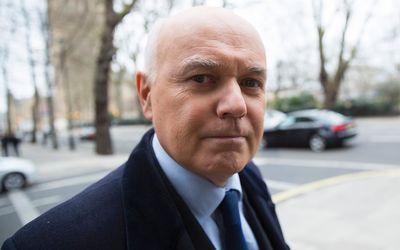ABOUT two weeks ago, Iain Duncan Smith, a former leader of the UK’s Conservative Party, resigned as secretary of state for work and pensions, dismayed at Chancellor of the Exchequer George Osborne’s plans to cut benefit payments to disabled people. His language was incendiary. He labelled the cuts "deeply unfair", not least on account of their juxtaposition with tax relief for the well-off.
His timing magnified the blast. With Britain facing a referendum over its membership of the European Union (EU), Duncan Smith and Osborne find themselves on opposing sides. Overnight, a low-level civil war had become an uncivil conflagration. The consequences for Osborne could be politically fatal. He and London mayor Boris Johnson lead the race to succeed David Cameron as party leader. What’s bad for Osborne is good for Johnson, and Duncan Smith’s hand grenade hit home.
Westminster burst into a frenzy of speculation. Was Duncan Smith’s resignation really motivated by his opposition to the planned spending cuts, or had it more to do with his desire to see Britain exit the EU? I won’t add to the speculation. What’s more interesting is the story his resignation tells about the politics of austerity in Britain.
There is an iron rule of UK politics: the party with greater trust from the electorate on the economy and with the most popular leader wins. The economic crisis of 2008 undid the last Labour government. When the Conservative-Liberal Democrat coalition took power in 2010, Britain was running a budget deficit of about 10%. Having developed a severe debt allergy, the public and the markets demanded a cure. That’s why the new government, a collaboration of ancient political foes, agreed to put deficit reduction at the heart of its agenda, making economic credibility its watchword.
Labour faced a choice: either it conceded it had overleveraged the country and tried to rebuild its credibility, or it ducked the question. Under the two Eds — Miliband and Balls — it chose the latter course, making life easy for Osborne and the coalition.
But Osborne was taking no chances. Like Gordon Brown before him, Osborne is an intensely political chancellor. He sought from the first to use fiscal policy to position Labour as a profligate party, addicted to debt, not to be trusted with the public’s money. His preferred way of doing this was to put in place a set of fiscal "rules", captured in a Charter of Budget Responsibility that he knows Labour can never support. In Westminster parlance, he sets Labour "traps" it cannot avoid.
In 2011, the first of his fiscal rules committed the government to eliminating the deficit over a rolling five-year forecast period. The Liberal Democrats were happy to sign up to the objective, leaving two critical questions to annual budget negotiations: whether to roll over the date at which the deficit would be eliminated, and what mix of tax and cuts should be used to do so.
When I joined the government in 2012, I quickly learnt that these negotiations were among the toughest inside the coalition. Typically, the Conservatives and Liberal Democrats would put forward a series of tax, spend and cut proposals and then the horse trading would begin. Each partner would get a "win"; each would have to swallow measures they would never implement were they governing alone. The upshot of this bartering is that coalition budgets tended to be centre-ground affairs: the richest paid more tax, the poorest bore the brunt of the cuts and the net result was the top and bottom quintiles of the British public shared the pain more or less evenly.
Then, in May last year, the Conservatives won a slim majority. Freed from the constraints of coalition, Osborne recast his fiscal rules to reflect a Conservative vision. He committed the government to achieving a surplus by 2019-20, and then continuing to run one each year unless gross domestic product growth dipped below 1%.
This new objective was time-fixed: no rolling forecast periods. And no longer was the aim just to balance the current account. It applied also to capital expenditure. In addition, he lowered the limit on the amount of money that could be spent on welfare.
These rules went some way beyond what was necessary to return Britain’s public finances to sound health. They represented also a very particular vision of the state’s place in the economy. Labour, predictably, refused to support the rules, in Osborne’s mind falling once more into the trap he had laid for them. But almost immediately, circumstances moved against him.
As part of a plan to reinforce the government’s economic credibility, in 2010 the coalition set up the Office for Budget Responsibility, an independent outfit that makes the growth and revenue projections on which budgets are premised. The merit of this idea is that it seeks to take the politics out of budgeting, making it impossible for governments to conjure from thin air projections that deliver the revenues they need to implement crowd-pleasing policies. The trouble, of course, is that the office is no better at predicting the future than anyone else, which means its projections constantly change. For Osborne’s next budget — the one introduced a couple of weeks ago — the office had downgraded its growth projections and, with them, its estimate of future government revenues.
Now, to meet his objective of ending the 2019-20 financial year with a surplus, Osborne had to find new money. Here, his judgment gave out. Among the cuts he proposed was an amount of £4.4bn from a programme called the Personal Independence Payment, designed to help disabled people do the everyday things — like taking a bath or getting to the shops — that able-bodied folk take for granted. At the same time, he cut corporations tax and capital gains tax and pushed up the threshold at which relatively well-off people fall into the 40% tax bracket. In the end, he projected a surplus in 2019-20 of about £10bn. Thus it is that his fiscal rules led to a head-on collision. Having laid a trap for Labour, Osborne found himself ensnared in it.
The government immediately went into damage-control mode. First, the new secretary of state for work and pensions announced there would be no further cuts to the welfare budget in this Parliament.
Then Osborne appeared in the House of Commons and declared his benefits cut to be a "mistake" — quite an admission for him — while delivering a robust defence of his overall economic strategy.
In fairness, he has some significant successes to boast about, not least record levels of employment and, in the current global climate, relatively robust levels of growth. But the damage to his credibility and leadership prospects is significant. It is only because a week is a long time in politics that it’s premature to write him off just yet.
• Coetzee is a former Democratic Alliance MP and campaign manager, who for the past few years has worked in the UK, first in the deputy prime minister’s office, then with the Liberal Democrats and now as director of strategy for the Stronger In campaign

The consequences of Conservative Iain Duncan Smith's resignation for Chancellor of the Exchequer George Osborne could be politically fatal, says the writer. Picture: REUTERS
ABOUT two weeks ago, Iain Duncan Smith, a former leader of the UK’s Conservative Party, resigned as secretary of state for work and pensions, dismayed at Chancellor of the Exchequer George Osborne’s plans to cut benefit payments to disabled people. His language was incendiary. He labelled the cuts "deeply unfair", not least on account of their juxtaposition with tax relief for the well-off.
His timing magnified the blast. With Britain facing a referendum over its membership of the European Union (EU), Duncan Smith and Osborne find themselves on opposing sides. Overnight, a low-level civil war had become an uncivil conflagration. The consequences for Osborne could be politically fatal. He and London mayor Boris Johnson lead the race to succeed David Cameron as party leader. What’s bad for Osborne is good for Johnson, and Duncan Smith’s hand grenade hit home.
Westminster burst into a frenzy of speculation. Was Duncan Smith’s resignation really motivated by his opposition to the planned spending cuts, or had it more to do with his desire to see Britain exit the EU? I won’t add to the speculation. What’s more interesting is the story his resignation tells about the politics of austerity in Britain.
There is an iron rule of UK politics: the party with greater trust from the electorate on the economy and with the most popular leader wins. The economic crisis of 2008 undid the last Labour government. When the Conservative-Liberal Democrat coalition took power in 2010, Britain was running a budget deficit of about 10%. Having developed a severe debt allergy, the public and the markets demanded a cure. That’s why the new government, a collaboration of ancient political foes, agreed to put deficit reduction at the heart of its agenda, making economic credibility its watchword.
Labour faced a choice: either it conceded it had overleveraged the country and tried to rebuild its credibility, or it ducked the question. Under the two Eds — Miliband and Balls — it chose the latter course, making life easy for Osborne and the coalition.
But Osborne was taking no chances. Like Gordon Brown before him, Osborne is an intensely political chancellor. He sought from the first to use fiscal policy to position Labour as a profligate party, addicted to debt, not to be trusted with the public’s money. His preferred way of doing this was to put in place a set of fiscal "rules", captured in a Charter of Budget Responsibility that he knows Labour can never support. In Westminster parlance, he sets Labour "traps" it cannot avoid.
In 2011, the first of his fiscal rules committed the government to eliminating the deficit over a rolling five-year forecast period. The Liberal Democrats were happy to sign up to the objective, leaving two critical questions to annual budget negotiations: whether to roll over the date at which the deficit would be eliminated, and what mix of tax and cuts should be used to do so.
When I joined the government in 2012, I quickly learnt that these negotiations were among the toughest inside the coalition. Typically, the Conservatives and Liberal Democrats would put forward a series of tax, spend and cut proposals and then the horse trading would begin. Each partner would get a "win"; each would have to swallow measures they would never implement were they governing alone. The upshot of this bartering is that coalition budgets tended to be centre-ground affairs: the richest paid more tax, the poorest bore the brunt of the cuts and the net result was the top and bottom quintiles of the British public shared the pain more or less evenly.
Then, in May last year, the Conservatives won a slim majority. Freed from the constraints of coalition, Osborne recast his fiscal rules to reflect a Conservative vision. He committed the government to achieving a surplus by 2019-20, and then continuing to run one each year unless gross domestic product growth dipped below 1%.
This new objective was time-fixed: no rolling forecast periods. And no longer was the aim just to balance the current account. It applied also to capital expenditure. In addition, he lowered the limit on the amount of money that could be spent on welfare.
These rules went some way beyond what was necessary to return Britain’s public finances to sound health. They represented also a very particular vision of the state’s place in the economy. Labour, predictably, refused to support the rules, in Osborne’s mind falling once more into the trap he had laid for them. But almost immediately, circumstances moved against him.
As part of a plan to reinforce the government’s economic credibility, in 2010 the coalition set up the Office for Budget Responsibility, an independent outfit that makes the growth and revenue projections on which budgets are premised. The merit of this idea is that it seeks to take the politics out of budgeting, making it impossible for governments to conjure from thin air projections that deliver the revenues they need to implement crowd-pleasing policies. The trouble, of course, is that the office is no better at predicting the future than anyone else, which means its projections constantly change. For Osborne’s next budget — the one introduced a couple of weeks ago — the office had downgraded its growth projections and, with them, its estimate of future government revenues.
Now, to meet his objective of ending the 2019-20 financial year with a surplus, Osborne had to find new money. Here, his judgment gave out. Among the cuts he proposed was an amount of £4.4bn from a programme called the Personal Independence Payment, designed to help disabled people do the everyday things — like taking a bath or getting to the shops — that able-bodied folk take for granted. At the same time, he cut corporations tax and capital gains tax and pushed up the threshold at which relatively well-off people fall into the 40% tax bracket. In the end, he projected a surplus in 2019-20 of about £10bn. Thus it is that his fiscal rules led to a head-on collision. Having laid a trap for Labour, Osborne found himself ensnared in it.
The government immediately went into damage-control mode. First, the new secretary of state for work and pensions announced there would be no further cuts to the welfare budget in this Parliament.
Then Osborne appeared in the House of Commons and declared his benefits cut to be a "mistake" — quite an admission for him — while delivering a robust defence of his overall economic strategy.
In fairness, he has some significant successes to boast about, not least record levels of employment and, in the current global climate, relatively robust levels of growth. But the damage to his credibility and leadership prospects is significant. It is only because a week is a long time in politics that it’s premature to write him off just yet.
• Coetzee is a former Democratic Alliance MP and campaign manager, who for the past few years has worked in the UK, first in the deputy prime minister’s office, then with the Liberal Democrats and now as director of strategy for the Stronger In campaign
























Change: 1.37%
Change: 1.32%
Change: 2.91%
Change: 0.45%
Change: 3.09%
Data supplied by Profile Data
Change: 1.59%
Change: 0.47%
Change: 1.37%
Change: 0.00%
Change: 0.44%
Data supplied by Profile Data
Change: 0.23%
Change: -0.03%
Change: 0.06%
Change: 0.30%
Change: 0.00%
Data supplied by Profile Data
Change: 0.25%
Change: 0.31%
Change: 0.13%
Change: 0.36%
Change: -0.66%
Data supplied by Profile Data